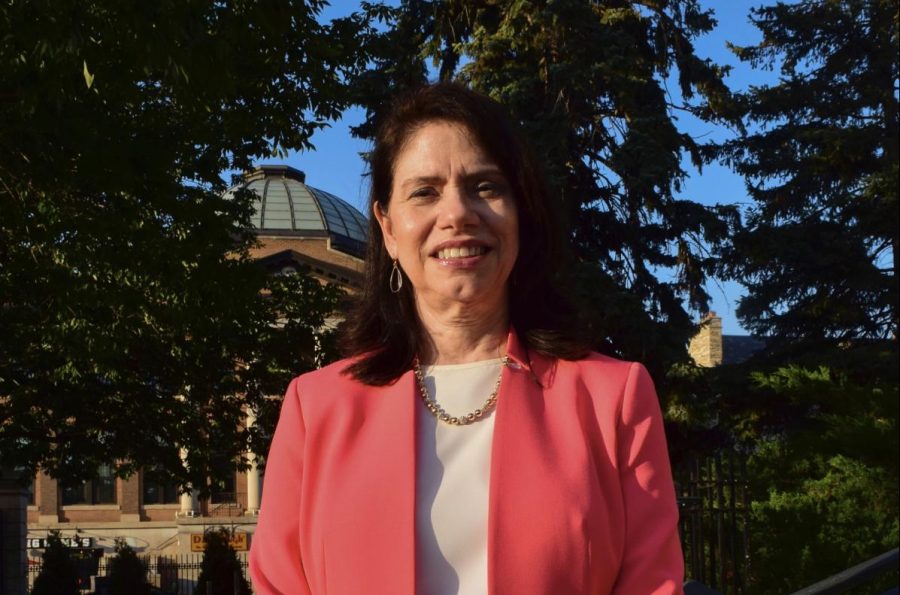 Christina Ewig and her husband Will Jones each spent 11 years teaching at the University of Wisconsin-Madison.
Christina Ewig and her husband Will Jones each spent 11 years teaching at the University of Wisconsin-Madison.
But shrinking state funding to the UW system and the adoption of controversial new tenure policies by the school’s Board of Regents led Ewig and Jones — part of a group of faculty members who have fled Wisconsin to work at the University of Minnesota and elsewhere — to consider other job offers.
“In many ways, being at UW Madison was a dream job for both of us,” Jones said. “We had, in the past, been asked to consider other options [at other schools], and we never really took them seriously.”
Ewig accepted an offer to be faculty director of the Center on Women, Gender, and Public Policy in the University’s Humphrey School of Public Affairs. She started this fall.
Jones, a history professor, also came to Minnesota in the fall for a position in the University’s Department of History.
Ewig said she wouldn’t have left Wisconsin had it not been for the budget cuts and tenure policy changes.
“It wasn’t an easy decision,” she said. “[But] the broader climate … made it a bit perilous to stay there.”
Budgets shrink
In July 2015, Wisconsin Gov. Scott Walker approved a plan to slash state funding of the University of Wisconsin by $250 million between 2015 and 2017.
Steep cuts in the state are nothing new — funding per student has dropped almost $4,000 since the early ’00s.
While tuition has remained stable throughout the cuts, the school has limited educational resources, which makes it hard to maintain faculty, according to the nonpartisan Wisconsin Budget Project.
Last year’s cuts created an $86 million budget deficit for the school, which expects to lose 418 faculty and staff positions through layoffs and attrition in the next two years as a result.
Ewig said such a significant decline in state funding will have the greatest impact on smaller departments.
Though UW officials said they won’t know for sure how much the budget cuts will impact faculty departures until October, the system has already been allocating funding to retain professors.
UW-Madison spokesman John Lucas said the school has invested nearly $16.5 million in research grants and salary increases for faculty to help ensure the school can stay competitive with offers from other universities.
The school does not yet have data that suggests that this year represents a larger than average number of faculty departures, Lucas said.
Hamline University political science professor David Schultz said Wisconsin has experienced an almost generation-long political conflict, partly due to pressures from conservative lawmakers to cut taxes to make the state more business-friendly.
However, Schultz said higher education is a major employer and driver of jobs. Continued cuts to the system may have a detrimental economic impact on the state including tuition increases, loss of graduates to other states and fewer out-of-state students.
Schultz said decreasing support to the UW system could also be due to political motivations by conservative lawmakers who see UW — particularly the Madison campus — as a left-leaning political threat.
“It’s basically government taking reprisals against people because they politically disagree, and that really runs serious First Amendment types of issues,” Schultz said.
Larry Jacobs, director of the Center for the Study of Politics and Governance in the University’s Humphrey School of Public Affairs and the Department of Political Science, said attempts by the legislature to influence the way the UW system operates has had a damaging impact not only on faculty morale but on the strength of the UW system.
“This is probably one of the very best university systems in the country and in the world,” he said. “The governor’s [actions] and the budget cuts had a material impact on that. It’s really done damage.”
Faculty flee to Minnesota
After nine years of research and teaching chemistry at Wisconsin’s Madison campus, Mahesh Mahanthappa left Wisconsin this year to teach chemical engineering at the University of Minnesota. The political climate played heavily into his decision, he said.
“The current [state] administration in Wisconsin has done a lot to devalue the worth that faculty members bring,” he said.
Changes to policies adopted by the Wisconsin Board of Regents weren’t just about tenure, Mahanthappa said, but also about what departments may be discontinued.
Similar concerns were also expressed by other science faculty members due to political pressure from the Wisconsin Legislature to avoid topics such as climate change, he said.
“Their jobs could potentially be at stake … if someone is doing something unpopular. Even in the sciences, those rules could lead to serious ramifications,” Mahanthappa said.
Chris Terry, a journalism professor who came to Minnesota from UW’s Milwaukee campus this fall, said the lack of resources in Wisconsin was a driving factor in his decision to leave.
“It was hard to get any sort of movement towards a better contract,” Terry said. “Promotions were almost unheard of.”
Terry said cuts to Milwaukee during his time there fundamentally changed the programs he was teaching.
“A temporary cut would have been one thing, but these are long-term structural cuts,” he said.
No simple fix
Will Jones said it may be difficult for the system to replace the faculty members it has lost, especially tenured professors.
“When people retire or take jobs elsewhere, it’s very difficult for a department to get authorized to rehire in that position,” he said.
The cheaper, more common option would be to replace professors with assistant professors, Jones said. But that would mean a loss of experience and institutional knowledge for the schools.
“They’ve retained a lot of people,” Jones said. “But the ones who have gone, I think, are going to be very difficult to replace. I think it’s going to be a long time before they can rebuild in the places that they’ve lost.”
Mahanthappa — whose research lab brings in about $600,000 in external funding — said that between research funding, salaries and benefits, the capital investment made by a university into each faculty member is very large over time.
“Losing people is losing that investment,” he said.
Jacobs said a hostile climate in Wisconsin makes it easier for other institutions, such as the University of Minnesota, to recruit UW professors.
“Faculty are in a global labor market,” Jacobs said. “You start targeting faculty, and the best people always have options to go elsewhere.”
Terry said having a hard time replacing faculty isn’t the only impact that state funding cuts could have on the system. Consolidating departments could also lead to larger class sizes and fewer class options.
“I think you’re just starting to see the beginning of the structural changes to the UW,” he said.
Schultz said a politically hostile environment in Wisconsin could potentially encourage lawmakers in other states to erode support for state-funded educational institutions.
“It sets this political precedent that says it’s okay to attack higher education,” Schultz said.
Jacobs said the costs of eroding state support far outweigh the benefits, and that other states may see that.
“I think what Walker’s doing may well end up deterring other conservative Republican governors from doing what they’re doing,” he said. “This is not a win for Gov. Walker; it’s going to be a stain on him.”







